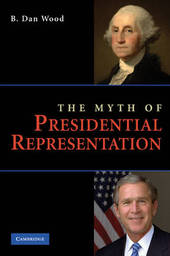
|
The Myth of Presidential Representation
Hardback
Main Details
| Title |
The Myth of Presidential Representation
|
| Authors and Contributors |
By (author) B. Dan Wood
|
| Physical Properties |
| Format:Hardback | | Pages:240 | | Dimensions(mm): Height 234,Width 160 |
|
| ISBN/Barcode |
9780521116589
|
| Classifications | Dewey:321.8042 |
|---|
| Audience | | Professional & Vocational | |
|---|
| Illustrations |
15 Tables, unspecified; 17 Line drawings, unspecified
|
|
Publishing Details |
| Publisher |
Cambridge University Press
|
| Imprint |
Cambridge University Press
|
| Publication Date |
22 June 2009 |
| Publication Country |
United Kingdom
|
Description
The Myth of Presidential Representation evaluates the nature of American presidential representation, examining the strongly embedded belief - held by the country's founders, as well as current American political culture and social science theory - that presidents should represent the community at large. Citizens expect presidents to reflect prevailing public sentiment and compromise in the national interest. Social scientists express these same ideas through theoretical models depicting presidential behavior as driven by centrism and issue stances adhering to the median voter. Yet partisanship seems to be a dominant theme of modern American politics. Do American presidents adhere to a centrist model of representation as envisioned by the founders? Or, do presidents typically attempt to lead the public toward their own more partisan positions? If so, how successful are they? What are the consequences of centrist versus partisan presidential representation? The Myth of Presidential Representation addresses these questions both theoretically and empirically.
Author Biography
B. Dan Wood holds the Cornerstone Fellowship at Texas A&M University. He is the author of The Politics of Economic Leadership: The Causes and Consequences of Presidential Rhetoric (2007) and coauthor of Bureaucratic Dynamics: The Role of Bureaucracy in a Democracy (1994), as well as numerous scholarly articles. Professor Wood has served on the editorial boards of the American Journal of Political Science, Presidential Studies Quarterly, Political Analysis, Political Research Quarterly, and American Politics Quarterly and is a frequent instructor at the European Consortium for Political Research summer methods program at the University of Essex.
Reviews"Dan Wood is one of our most respected scholars. In this new book Wood asks the question: Are presidents responsive to public opinion when making policy decisions? Wood uses a meticulously collected data set, the best yet collected to address this question, as well as advanced and appropriate time series analysis techniques. He finds little presidential responsiveness, contrary to several major studies. Wood's findings have profound implications for the operation of democracy in the United States, for our understanding of the relationship between the president and the public, and will stimulate much debate and research on this important topic." - Jeffrey Cohen, Fordham University "In this valuable book, Dan Wood uses his usual rigorous approach to research and finds that presidents are not reflections of public opinion but instead are ideological partisans more concerned with advancing their own agendas. Not only are presidents not representatives of the public, but they also have little success in persuading the public to follow their lead. These findings provide significant food for thought for every student of the presidency." - George C. Edwards III, Texas A&M University "Wood provides a thoughtful and provocative examination of the political relationship between the president and the American public. His conclusions will frustrate and disappoint plenty of scholars, but his analysis will be impossible to ignore. The Myth of Presidential Representation should be required reading for students of the presidency, public opinion, and public policymaking more generally." - Irwin Morris, University of Maryland "Wood is to be commended for the complexity and and richness of his analysis and for the creative use of presidential public statements as variables of analysis. One does not have to agree with all of his conclusions to recognize the sophistication and power of his analysis. A strong contribution to the question of presidential representation that should drive research for years to come." CHOICE, A.L. Crothers, Illinois State University
|